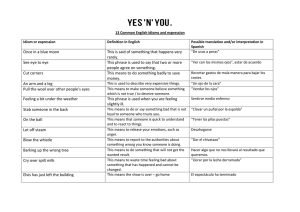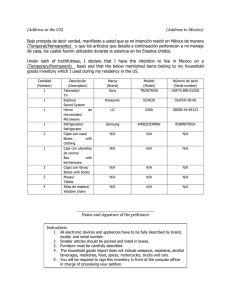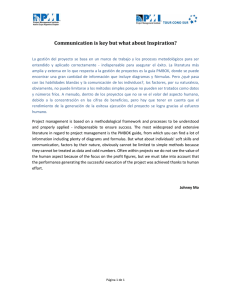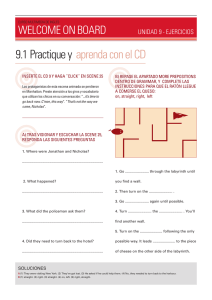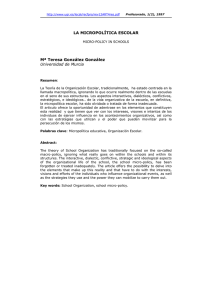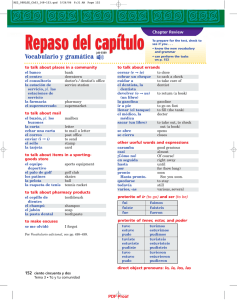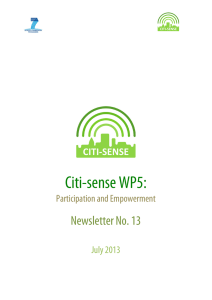Política del Municipio de Tucson respecto a Cambios en
Anuncio
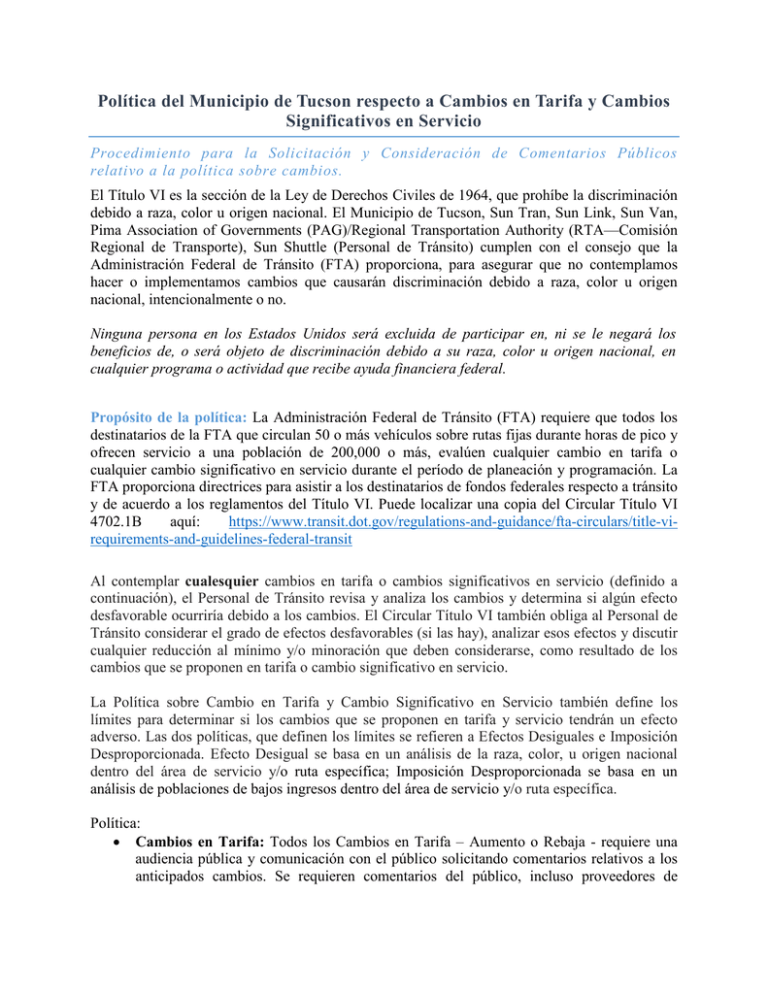
Política del Municipio de Tucson respecto a Cambios en Tarifa y Cambios
Significativos en Servicio
Procedimiento para la Solicitación y Consideración de Comentarios Públicos
relativo a la política sobre cambios.
El Título VI es la sección de la Ley de Derechos Civiles de 1964, que prohíbe la discriminación
debido a raza, color u origen nacional. El Municipio de Tucson, Sun Tran, Sun Link, Sun Van,
Pima Association of Governments (PAG)/Regional Transportation Authority (RTA—Comisión
Regional de Transporte), Sun Shuttle (Personal de Tránsito) cumplen con el consejo que la
Administración Federal de Tránsito (FTA) proporciona, para asegurar que no contemplamos
hacer o implementamos cambios que causarán discriminación debido a raza, color u origen
nacional, intencionalmente o no.
Ninguna persona en los Estados Unidos será excluida de participar en, ni se le negará los
beneficios de, o será objeto de discriminación debido a su raza, color u origen nacional, en
cualquier programa o actividad que recibe ayuda financiera federal.
Propósito de la política: La Administración Federal de Tránsito (FTA) requiere que todos los
destinatarios de la FTA que circulan 50 o más vehículos sobre rutas fijas durante horas de pico y
ofrecen servicio a una población de 200,000 o más, evalúen cualquier cambio en tarifa o
cualquier cambio significativo en servicio durante el período de planeación y programación. La
FTA proporciona directrices para asistir a los destinatarios de fondos federales respecto a tránsito
y de acuerdo a los reglamentos del Título VI. Puede localizar una copia del Circular Título VI
4702.1B
aquí:
https://www.transit.dot.gov/regulations-and-guidance/fta-circulars/title-virequirements-and-guidelines-federal-transit
Al contemplar cualesquier cambios en tarifa o cambios significativos en servicio (definido a
continuación), el Personal de Tránsito revisa y analiza los cambios y determina si algún efecto
desfavorable ocurriría debido a los cambios. El Circular Título VI también obliga al Personal de
Tránsito considerar el grado de efectos desfavorables (si las hay), analizar esos efectos y discutir
cualquier reducción al mínimo y/o minoración que deben considerarse, como resultado de los
cambios que se proponen en tarifa o cambio significativo en servicio.
La Política sobre Cambio en Tarifa y Cambio Significativo en Servicio también define los
límites para determinar si los cambios que se proponen en tarifa y servicio tendrán un efecto
adverso. Las dos políticas, que definen los límites se refieren a Efectos Desiguales e Imposición
Desproporcionada. Efecto Desigual se basa en un análisis de la raza, color, u origen nacional
dentro del área de servicio y/o ruta específica; Imposición Desproporcionada se basa en un
análisis de poblaciones de bajos ingresos dentro del área de servicio y/o ruta específica.
Política:
• Cambios en Tarifa: Todos los Cambios en Tarifa – Aumento o Rebaja - requiere una
audiencia pública y comunicación con el público solicitando comentarios relativos a los
anticipados cambios. Se requieren comentarios del público, incluso proveedores de
transporte privado, usuarios del Sistema, así como juntas directivas, comités y
comisiones.
•
Cambios Significativos en Servicio: Veinticinco por ciento (+/- 25%) o más cambio –
aumento o rebaja – de ingresos en millas, ingresos en horas, o número de pasajeros
basado en la más reciente encuesta o muestra.
•
Impacto Desigual: Veinticinco por ciento (+/-20%) o más diferencia entre poblaciones
minoritaria y no-minoritaria; poblaciones minoritarias incluyen Indígenas de Norte
América y Alaska; Asiáticos (incluye los pueblos del Lejano Oriente, Sureste de Asia o
del subcontinente de India), Negro o Áfrico Americano, Hispano o Latino (indiferente de
raza), and Nativo de Hawái u otro Isleño del Pacífico.
•
Imposición Desproporcionada: Veinticinco por ciento (+/-20%) o más diferencia entre
poblaciones no de bajos ingresos y poblaciones de bajos ingresos (individuos elegibles
para una Tarjeta y Cédula de Identidad SunGo)
Si se identifica un posible impacto desigual (y/o imposición desproporcionada), entonces se
tomarán las medidas o alternativas para evitar, reducir al mínimo o minorar los efectos. Luego el
Personal analizará de nuevo el plan modificado de servicio para determinar si los efectos se
evitaron, se redujeron al mínimo o aminoraron. Si los anticipados cambios no se alteran
(cambian), los cambios para servicios o tarifa se pueden implementar, con la aprobación del
Alcalde y Consejo Municipal. Los cambios deben reflejar una verdadera y justificación legítima
y demonstrar que no hay alternativas prácticas que pudiera tener menos impacto en la población
minoritaria (y/o población de bajos ingresos), y todavía poder llevar a cabo las metas legítimas
del programa.
b)
Major Service Changes:
A public hearing must be held if there is any major service change to any
of the public transportation modes (e.g., Sun Tran, Sun Van, or Sun Link).
For all major service changes, the FTA requires all City of Tucson transit
providers (e.g., Sun Tran, Sun Van, and Sun Link) to develop guidelines
and thresholds for what it considers a “major” service change to be. For
major service changes, the FTA requires the City of Tucson to conduct a
Service Equity Analysis, which includes an analysis of adverse effects
relating to possible disparate impacts and disproportionate burden. It is
the City of Tucson’s policy to conduct a Service Equity Analysis for any
proposed major service changes.
The following is considered a major service change (unless otherwise
noted under “Exemptions”) and will be evaluated in accordance with the
regulatory requirements set forth in FTA Circular 4702.1B:
A major service change (thresholds) is defined as any change in service
that would add or eliminate more than:
1.
Twenty-five percent (25%) or more of the route revenue miles on
any individual route; or
2.
Twenty-five percent (25%) or more of the route revenue hours on
any individual route; or
3.
Twenty-five percent (25%) or more of the ridership on any
individual route (based on the most recent route survey or sample).
Exemptions:
The major service change thresholds exclude any changes to service that are
caused by the following:
•
Initiation/Discontinuance of Temporary or Demonstration Services The initiation or discontinuance of a temporary transit service or
demonstration service that will be or has been in effect for less than
one year.
•
Initiation/Discontinuance of any Promotional Fares.
•
Natural or Catastrophic Disasters - Forces of nature such as
earthquakes, wildfires, or other natural disasters or human-caused
catastrophic disasters that may force the suspension of transit
service for public safety or technical events.
•
Temporary Route Detours – A short-term change to a route caused
by road construction, routine road maintenance, road closures,
{A0058942.DOCX/}
2
emergency road conditions, fiscal crisis, civil demonstrations, or
any uncontrollable circumstance.
c)
Public Notice Requirements:
Prior to the implementation of any fare change or major service change
that falls within the levels established above, notices of public hearing will
be published in the newspaper of general circulation in the urbanized
area. Two notices will be published at least thirty (30) days prior to the
hearing and the second one at least five (5) days prior to the hearing. The
notices will contain the description of the contemplated fare change or
major service change, as appropriate, and the time and place of the
hearing. Public transportation users will be notified through placards or
notices on the vehicles, all outlets selling bus passes, and all transit
centers. Any interested citizen may address the governing body related to
the proposed fare change or major service change.
d)
Applicability to Third-Party Contract Recipients:
Any agency, firm, or governmental jurisdiction which operates public
transit service within the Tucson urbanized area utilizing FTA funds
provided through the City of Tucson shall follow the above process to
solicit and consider public comment prior to any fare change or major
service change.
IV.
Definitions:
Adverse Effects - The City of Tucson shall define and analyze adverse effects
related to major changes in transit service. Adverse effects are measured by the
change between the existing and proposed service levels that would be deemed
significant. Changes in service that have an adverse effect and that may result in
a disparate impact include reductions in service (e.g., elimination of route,
shortlining a route, rerouting an existing route, increase in headways).
Elimination of a route will generally have a greater adverse impact than a change
in headways. Additions to service may also result in disparate impacts,
especially if they come at the expense of reductions in service on other routes.
Disparate Impact – Refers to a facially neutral policy or practice that
disproportionately affects members of a group identified by race, color, or
national origin, where City of Tucson’s policy or practice lacks a substantial
legitimate justification and where there exists one or more alternatives that would
serve the same legitimate objectives but with less disproportionate effect on the
basis of race, color, or national origin.
Disproportionate Burden – Refers to a neutral policy or practice that
disproportionately affects low-income populations more than non-low-income
{A0058942.DOCX/}
3
populations. A finding of disproportionate burden requires the City of Tucson to
evaluate alternatives and mitigate burdens where practicable.
Low-Income Person - Means a person whose median household income is at or
below the U.S. Department of Health and Human Services (HHS) poverty
guidelines.
Minority Population – Means any readily identifiable group of minority persons
who live in geographic proximity and, if circumstances warrant, geographically
dispersed/transient populations (such as migrant workers or Native Americans)
who will be similarly affected by a proposed DOT program, policy, or activity.
Predominantly Minority Area - Means a geographic area, such as a
neighborhood, Census tract, block or block group, or traffic analysis zone, where
the proportion of minority persons residing in that area exceeds the average
proportion of minority persons in the recipient’s service area.
V.
Policies:
a)
Fare Change Policy
For changes to existing transit fares, the FTA requires all City of Tucson
(e.g. Sun Tran, Sun Van, and Sun Link) transit providers to conduct a fare
equity analysis for all potential transit fare adjustments. It is the City of
Tucson’s policy to conduct a Fare Equity Analysis for all proposed fare
changes.
b)
Major Service Change Policy
For all major service changes, the FTA requires all City of Tucson transit
providers (e.g. Sun Tran, Sun Van, and Sun Link) to develop guidelines
and thresholds for what it considers a “major” service change to be. For
major service changes, the FTA requires the City of Tucson to conduct a
Service Equity Analysis, which includes an analysis of adverse effects
relating to possible disparate impacts and disproportionate burden. It is
the City of Tucson’s policy to conduct a Service Equity Analysis for any
proposed major service changes.
c)
Disparate Impact Policy
The purpose of the Disparate Impact Policy is to establish a threshold
which identifies when adverse effects of any fare change or major service
change that is borne disproportionately by minority populations.
For the purpose of this policy, minority population means any readily
identifiable group of minority persons who live in geographic proximity and
in residential land use areas within Census tracts where the percentage of
minority persons is higher than the Sun Tran service area average.
A disparate impact occurs if a proposed fare or major service change
requires a minority population to bear adverse effects by twenty percent
{A0058942.DOCX/}
4
(20%) or more than the adverse effects borne by the non-minority
population.
If the City of Tucson finds a potential disparate impact, the transit agency
will take steps to avoid, minimize or mitigate impacts then re-analyze the
modified service plan to determine whether the impacts were avoided,
minimized or mitigated. If the City of Tucson chooses not to alter the
proposed changes, the transit agency may implement the fare or service
change if there is substantial legitimate justification for the change and the
transit agency can show that there are no alternatives that would have
less of an impact on the minority population and would still accomplish the
agency’s legitimate program goals.
d)
Disproportionate Burden Policy
The purpose of this policy is to establish a threshold which identifies when
adverse effects of any fare or major service change are borne
disproportionately by low-income populations.
A disproportionate burden occurs if a proposed fare or major service
change requires a low income population to bear adverse effects by
twenty percent (20%) or more than the adverse effects borne by the nonlow income population.
If the City of Tucson finds a potential disproportionate burden, the transit
agency will take steps to avoid, minimize or mitigate impacts then
reanalyze the modified service plan to determine whether the impacts
were avoided, minimized or mitigated. If the City of Tucson chooses not to
alter the proposed changes, the agency may implement the service or fare
change if there is substantial legitimate justification for the change and the
agency can show that there are no practical alternatives that would have
less of an impact on the low-income population and would still accomplish
the agency’s legitimate program goals.
{A0058942.DOCX/}
5
